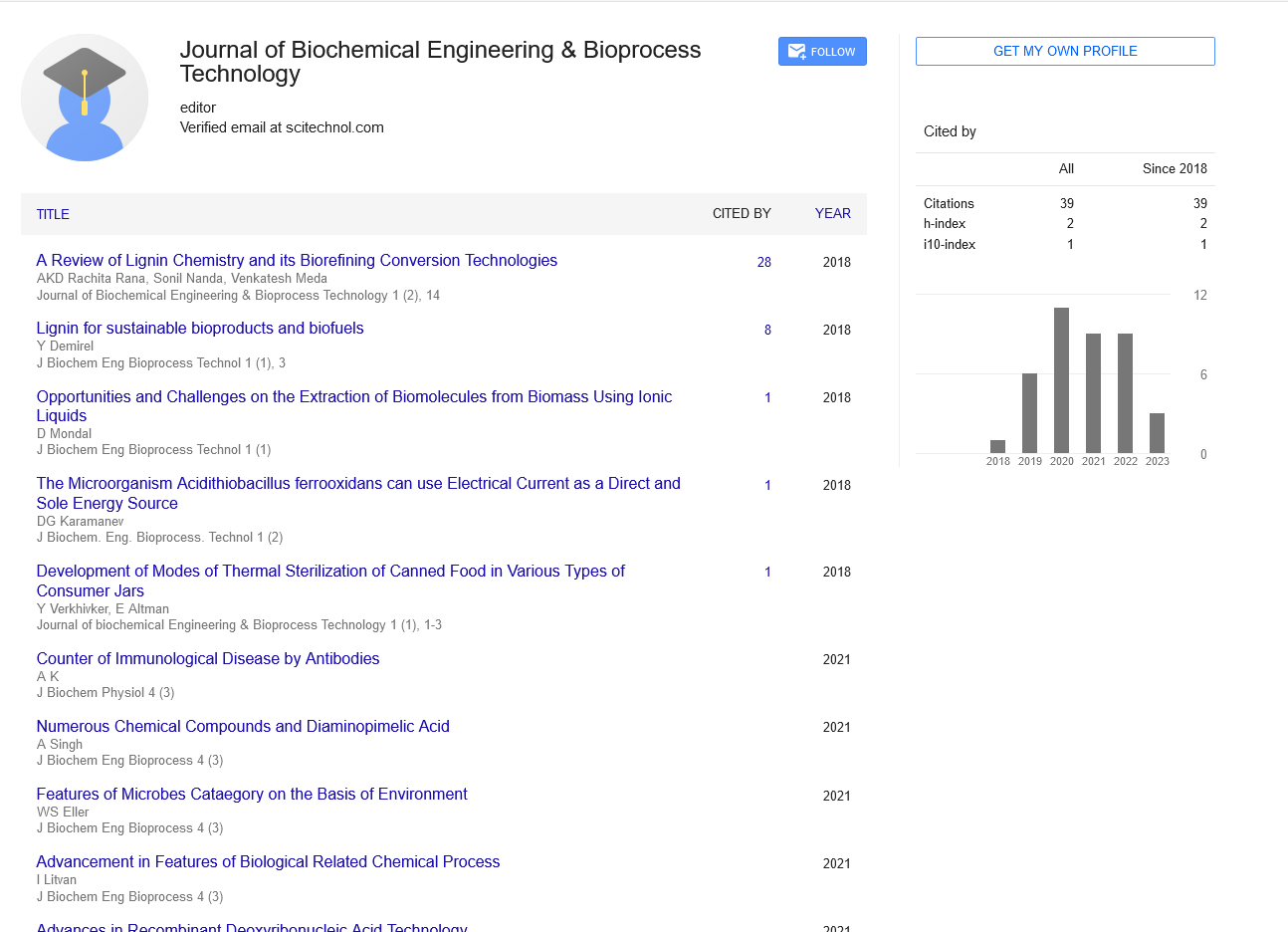Opinion Article, J Biochem Eng Bioprocess Vol: 6 Issue: 2
Nanotechnology in Biochemical Engineering: Nanobiocatalysis and Nanostructured Biomaterials
Dashiell Lyra*
1Department of Biochemical Engineering & Bioprocess Technology, Technische Universität Berlin , Berlin, Germany
*Corresponding Author: Dashiell Lyra,
Department of Biochemical
Engineering & Bioprocess Technology, Technische Universität Berlin, Berlin,
Germany
E-mail: lyradashiell@gmail.com
Received date: 22 May, 2023, Manuscript No. JBEBT-23-106944;
Editor assigned date: 24 May, 2023, Pre QC. JBEBT-23-106944 (PQ);
Reviewed date: 15 June, 2023, QC No. JBEBT-23-106944;
Revised date: 22 June, 2023, Manuscript No. JBEBT-23-106944 (R);
Published date: 29 June, 2023, DOI: 10.35248/jbebt.1000067.
Citation: Lyra D (2023) Nanotechnology in Biochemical Engineering: Nanobiocatalysis and Nanostructured Biomaterials. J Biochem Eng Bioprocess 7:2.
Keywords: Bioprocess
Description
Nanotechnology has emerged as a powerful tool in biochemical engineering, offering new avenues for the development of advanced biocatalysis systems and nanostructured biomaterials. This study provides a brief overview of the applications of nanotechnology in biochemical engineering, with a focus on nanobiocatalysis, nanostructured biomaterials, and beyond. It explores how nanotechnology enables the design and optimization of biocatalysts at the nanoscale, the development of nanostructured biomaterials for various applications, and the integration of nanotechnology with other emerging fields such as synthetic biology and biomedical engineering. Furthermore, the study highlights the potential of nanotechnology in driving advancements in bioprocessing, environmental sustainability, and biomedical applications.
Nanobiocatalysis: Enhancing biocatalytic performance
Nanobiocatalysis combines the advantages of nanotechnology with biocatalysis to enhance the performance of enzymes and other biological catalysts. This section explores how nanotechnology is used to immobilize enzymes on nanostructured supports, enhancing enzyme stability, activity, and reusability. It discusses the integration of nanoparticles, nanofibers, and nanocomposites into biocatalytic systems for efficient and selective transformations. Additionally, it highlights the potential of nanoscale confinement and enzyme encapsulation for controlling enzyme-substrate interactions and modulating catalytic activity.
Nanostructured biomaterials: Tailored functionalities
Nanostructured biomaterials offer unique properties and tailored functionalities for diverse applications in biochemical engineering. This section discusses the development of nanostructured biomaterials, such as nanofibers, nanoparticles, and nanostructured membranes, for applications in drug delivery, tissue engineering, and biosensing. It explores how nanotechnology enables precise control over material properties, such as mechanical strength, porosity, and surface characteristics, to mimic natural extracellular matrices and enhance biocompatibility. Furthermore, it highlights the use of nanomaterials for controlled release of therapeutics, targeted delivery,and cellular interactions in regenerative medicine and drug discovery.
Nanotechnology in synthetic biology: Integration and enhancement
Nanotechnology and synthetic biology have a synergistic relationship, with nanotechnology enhancing the capabilities of synthetic biological systems. This section discusses the integration of nanotechnology with synthetic biology tools, such as genetic circuits, biosensors, and gene delivery systems. It explores how nanoscale structures and materials enable precise control and regulation of gene expression, signal transduction, and cellular behavior. Additionally, it highlights the use of nanomaterials for genetic manipulation, gene delivery, and imaging in synthetic biology applications.
Environmental sustainability: Nanotechnology for bioprocessing
Nanotechnology plays a significant role in advancing environmental sustainability in bioprocessing. This section discusses how nanotechnology enables efficient and environmentally friendly bioprocesses. It explores the use of nanomaterials for waste treatment, bioremediation, and bioenergy production. It also highlights the potential of nanoscale sensors and monitoring systems for real-time environmental monitoring and process optimization. Furthermore, it discusses the integration of nanotechnology with renewable feedstocks and green chemistry principles to minimize the environmental impact of bioprocessing.
Biomedical applications: Nanotechnology for healthcare
Nanotechnology has transformative potential in biomedical applications, offering new approaches for diagnostics, therapeutics, and tissue engineering. This section discusses how nanotechnology enables targeted drug delivery, imaging, and biosensing for improved diagnostics and personalized medicine. It explores the use of nanomaterials for tissue engineering scaffolds, regenerative medicine, and controlled release systems. Additionally, it highlights the potential of nanoscale systems for cancer therapy, antimicrobial applications, and biomedical sensing devices.
Challenges and future perspectives
While nanotechnology in biochemical engineering offers tremendous potential, challenges such as safety, scalability, and regulatory considerations need to be addressed. This section discusses the importance of responsible nanomaterial design, characterization, and toxicity assessment. It emphasizes the need for scalable and costeffective manufacturing processes for nanoscale materials. Furthermore, it explores future perspectives, including the integration of nanotechnology with other emerging fields such as artificial intelligence and 3D printing, to further advance the capabilities of nanotechnology in biochemical engineering.
Conclusion
Nanotechnology has transformed biochemical engineering, enabling advancements in nanobiocatalysis, nanostructured biomaterials, and interdisciplinary applications. Continued research and development in nanotechnology will drive progress in bioprocessing, environmental sustainability, and biomedical applications, unlocking new opportunities for the field.
 Spanish
Spanish  Chinese
Chinese  Russian
Russian  German
German  French
French  Japanese
Japanese  Portuguese
Portuguese  Hindi
Hindi 